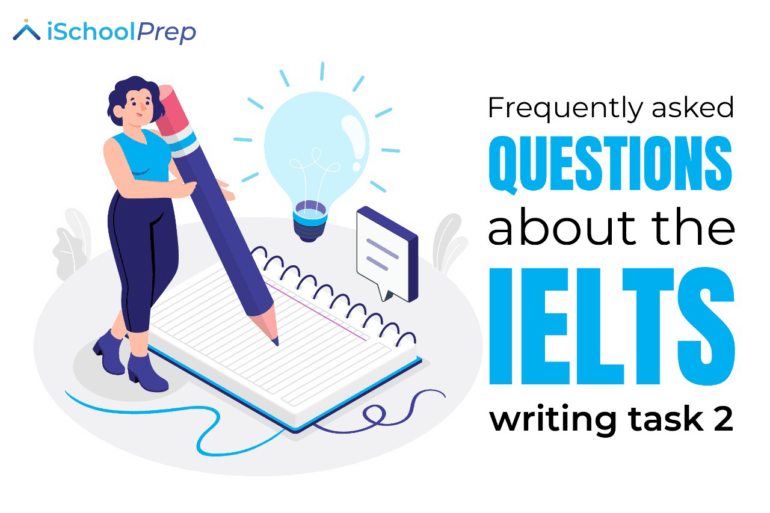Table of Contents
Preparing for the IELTS exam can confuse you every step of the way, especially when it comes to the writing tasks. The format is given, however, it is difficult to know the questions asked in writing task 2. Here are some of the most frequently asked IELTS writing task 2 questions!
IELTS exam | An overview
The IELTS, or International English Language Testing System, is a standardized English language proficiency assessment for candidates willing to move abroad for international education or migration. The IELTS certification is also widely recognized in 140+ countries, including the UK, USA, Canada, Australia, and New Zealand.
Though the test is a standard assessment, many non-native speakers find IELTS challenging to get through. This is because the academic writing paper requires you to prove your efficiency by listening, reading, writing, and speaking. Besides that, it also requires venturing into your argumentative style and analytical skills. Naturally, students find it a hurdle amidst tackling their subjects. Thus, for your ease of preparation, we have collected the most frequently asked IELTS writing task questions to make the process easier and even get you a scholarship!
IELTS writing task 1
Writing task 1 is a simple segment containing images of charts, diagrams, graphs, or a table. The question will ask you to analyze and compare the data given in the images in 150 words. Moreover, most students find it a no-brainer to formulate a 150-word answer in formal or academic language. However, remember to adhere to the time limit and wrap up task 1 in a maximum of 20 minutes.
Frequently asked questions in IELTS writing task 2
IELTS writing task 2 is daunting, especially under the strict time limit. You are asked to write an essay of 250 words on a diverse range of topics. Naturally, task 2 is a bit trickier. In this case, the topics can ask for anything and are practically impromptu, providing little to no scope of prior arrangements. However, it is also true that you can locate and narrow down the domains and prepare accordingly. The following are the top 10 helpful distinctions to keep in mind, and the frequently asked IELTS writing task 2 questions are based on them-
1. Art
- Issues of censorship
- Creativity
- Art and society
- Treatment of art in school
2. Business
- Leadership and management
- Business and technology
- Small, large, and international businesses
- Consumerism and materialism
- Knowledge and skills for business

3. Crime and punishment
- Prison
- Role of police
- The distinction of gender in law
- Teenage crime
- Cause and nature of crimes
- Punishment and reforms
4. Environment
- Climate change
- Ecological conservation
- Treatment of animals
- Concept of zoos
- Role of government vs individual
5. Food and diet
- Food and nutrition
- Imported food items
- Junk food and its consequence
- Diet trends
- The traditional concept of food and cooking

6. Health
- Role of exercise
- Healthcare facilities
- Dealing with epidemics
- Health and education
- Healthcare in backward countries
7. Media
- Censorship and expression
- Children’s programs
- Media and reporting technology
- Quality of journalism
- Advertising
8. Money
- Financial literacy
- Tax
- Money and success
9. Society
- Lifestyle
- Poverty and homelessness
- Crime rates
- Population control
- Public services
10. Technology
- Digital crimes
- Children and technology
- Privacy and information
- Social media and digital well-being

In addition, there are some more essay topics that are considered part of the curriculum and should be focused upon-
1. Education
- Education and technology
- Syllabus and its relevance
- Role of influential teachers
- Discipline in school
2. Language
- Relationship between culture and language
- Language learning
- The gap of translation
- Travel and language
- Disappearing languages
3. Reading
- Books publishing in the digital age
- E-books vs paperbacks
- The habit of reading
- Books and leisure
- Role of libraries

4. Sport
- Sport as an academic subject
- The role of gender in sports
- The role of sports in mental wellbeing
5. Workplace
- Employment/unemployment
- Women in the workspace
- Child labor
- Role of work environment
- Productivity and criticism
How to prepare for IELTS writing task 2?
Now that you know the problem areas that you need to focus on, you can start preparing with these tips:
- Get hold of IELTS books: These books have chapters dedicated to the frequently asked IELTS writing task 2 questions.
- Develop a vocabulary for different genres: Knowing key terms of business and technology, for instance, will make a lasting impression and will display your knowledge.
- Read on the different topics: You must also stay up to date with the latest news and updates on the recurring genre.
- Practice constructing essays at home: This will keep you in the practice of using vocabulary as well as allow you to evaluate the tone and essence of your writings.
- Set up timers: It is often seen that students are so overjoyed with the questions that they lose track of time and word limit while performing. Avoid this blunder by making it a habit to write essays at home with the timer on.
- Avoid repetition: Since the word limit is quite strict, the questions ask you to present crisp content addressing the topics. Therefore, focus on adhering to the core argument and finish with an impactful conclusion.

Key takeaways
- Understand the core argument of the question. Since the language of questions can appear confusing and if you fail to grasp what you have to answer, the essay might come up as fluff.
- Create a blueprint of your essay. Planning an essay is as important as writing it. Thus arrange your arguments/points to create a seamless structure for the desired impact.
- Follow the standard introduction-body-conclusion format. Firstly, the introduction should hit the bull’s eye and immediately be composed in a way that shows your understanding of the main argument. You may also add a brief overview of what you are going to cover in the body in a couple of lines. Then, the body will contain all the information that you are willing to add to the essay. Subsequently, create paragraphs and increase the readability of your piece. Lastly, the conclusion should only tie the loose ends, if any, and provide a comprehensive inference to your essay. Refrain from introducing any new argument here.
We hope you enjoyed reading this blog. In case of any queries, reach out to us or drop a comment below!
Liked this Blog? Read more: IELTS writing task | Amazing tips you must know about!
FAQ
Q1. What are some tips for IELTS writing task 2?
Answer- The IELTS writing task 2 is based on your knowledge and understanding of the question posed. Always ensure that you’ve read and understood the question correctly. For a smooth flow in writing, make an outline first of all the points needed to be covered. Second, keep your points crisp and simple. Third, focus on your grammar by keeping it simple. Using complex vocabulary might lead to incorrect grammar usage. Lastly, practice as much as you can and answer all parts of the question.
Q2. What are the types of essays in IELTS writing task 2?
Answer- There are various types of essay questions that may be asked in the writing task. They’re generally based on the following categories-
- Opinion
- Discussion
- Multi-part
- Multi-part and opinion
- Advantages and disadvantages
- Positive or negative
- Cause and solution
Q3. How to organize my paragraphs in the IELTS writing task?
Answer- For the IELTS writing task, your paragraph structure should be basic. Furthermore, you can divide your paragraphs into 4 parts-
- Introduction
- Body paragraph with your main supporting point
- Body paragraph with your secondary supporting point
- Conclusion
You can always make 5 paragraphs, however, ensure that you’re adhering to the word limit.






